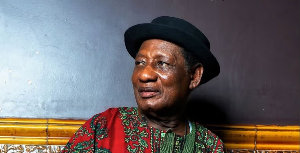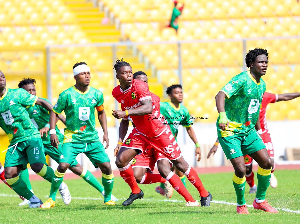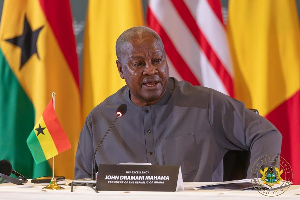On The Neck Of Contemporary Ghana, But Who Is To Be Blamed??
It was staggering to have read from the news outlets, and as stated by Police Inspector Simon Tenkuu, Public Relations Officer of National Motor Traffic and Transport Unit (MTTU) of Ghana Police Service at the inauguration of General Road Users Safety Association (GRUSA) in Accra on 14th April, 2011, that a total of 2,989 accident cases recorded within the first quarter of 2011, 400 of them were fatal, 797 were serious and 1,792 were minor cases, 432 pedestrians were knocked down while 3,166 persons received injuries. Moreover, as he indicated, about 540 deaths were recorded.
This is not the first time – neither is it the second time – that such litters of publications have been brought to the thoughtfulness of the public. There have been multitudinous stakeholders and public interrogation of these unsavory occurrences in order to arrest the situation. This problem erodes the human resource base of our nation, coupled with the huge financial compulsion it places on our limited financial resources in vein of addressing the situation. This issue is discussed impartially without political coloration and expediency, religious affiliation, tribal, or ethnic connotation etc. However, the situation keeps deteriorating from bad to worse considering the periodic statistics that have been made available by the Motor Traffic and Transport Unit (MTTU) on road-motor accidents.
One will therefore be forced to ask where the problem lies all this while.
A quick rein on our roads linking cities/towns and villages clearly shows that the same nature of roads that were constructed many years ago – and apparently need reengineering – are those that are being used now, notwithstanding, the absurd influx of all kinds of vehicles in the country. These roads yoking towns and village – where these road-motor accidents mostly occur – were constructed in commensuration of the number of vehicles and engineering techniques and skills available to our country at that time. However, with the emergence of technologies, new engineering ideas and more technologically advanced road safety equipment, one would expect that the Ghana Highway Authority, Department of Urban Roads, Department of Feeder Roads and the Building and Road Research Institute could have taken advantage of these innovations to re-engineer the wrecking roads to provide accident free roads, or employ the services of some of this equipment to monitor vehicle movement on the road. But, it seems the tax payers’ money, some of which are sourced from the Road Funds (derived from monies levied on fuel, tolls and vehicle license) and other budgetary allocations from the government, are not defeating the ultimate purpose to which it has been allotted to, whereas the citizenry is literally perishing with bad roads as a major factor among the medley of factors.
However, the shuffle of bureaucracies that results in awarding road construction contracts to incompetent contractors, and, resulting in road deterioration in the shortest time after completion should be frowned upon and dealt with.
Act 569 was established in 1999 by the Parliament of our country to provide legal and administrative framework to DVLA, to ensure safety on our roads. One of the cardinal requirements of DVLA, as read from www.dvlagh.gov.gh, clearly, states that, the individual applying for a driver’s license must “have B.E.C.E or the ability to read, comprehend and write simple English Language.” This, in my view, will enable the would-be driver be in the capacity to fathom simple road signs and readings, which are fundamentally positioned along the roadsides, to communicate to drivers on the dangers and cautions ahead of the road. Such that, the occurrences of this much talked about plague could be subdued. But the question that remains unanswered is, has this requisition been strictly upheld? Or it has been compromised on some mischievous and parochial interest at the galling expense of the ordinary Ghanaian?
Mechanical failures – such as, brake failure, tire busting among others – have also been found to be the causes of these high degree road accidents in the country. Then, how effective has been one of the major roles of DVLA, in examining, and, thereafter issuing road worthy certificates to vehicles to ensure its road worthiness before those vehicles ‘hit’ the road? Well, we are all aware of the compunctious image surrounding Benz 207 vehicles and how appalling these images are. But, were these Benz 207 vehicles really meant to run as passenger-carrying vehicles, or goods-carrying vehicles? It therefore behooves on the DVLA to blue-pencil their notes on vehicle conversion.
The least said about the emerging conversion of petrol driven vehicles to gas the better. Government must wake up to halt this inimical trend mostly by taxi drivers and their owners before it escalate. Knowing, succinctly, how suicidal it will be in the slightest collision of gas driven vehicles.
On this note, I’ll, overwhelmingly, applaud the works and services of the Brong Ahafo DVLA boss, Mr. Emmanuel Teye Narh, for his resolute and uncompromising efforts. He’s ensured that the tenets and principles enshrined in the by-laws of the DVLA are strongly upheld to the fullest at all times without fear or favor to championing a Ghana – free from road-motor accidents. Kudos, Sir!
The safety of the people on our roads in our dear nation is entrusted in the hands of the Motor Traffic and Transport Unit (MTTU) under the Ghana Police Service. But of what relevance will their work be if 183 of the very people they are charged to safeguard the roads are lost in road-motor accidents within 5months into the year. The police service (MTTU) is charged to ensure the compliance of road safety rules and regulations. But how far have they gone with satisfying these obligations? Unfortunately, they have practically compromised their professional responsibilities to satisfy their penchant to cupidity, by dealing with delinquent drivers in their own way. Also, the canteen culture of the MTTU should be lampooned and rubbished. Commercial and private drivers charged on the same scale offence should equally, and, proportionately be dealt with law. Clearly, this canker has eaten deep into the moral fiber of these ‘diamonds in the rough,’ which, indeed, is now of public knowledge and has been ridiculed in movies and other comic set ups. But against this backdrop, a resolute purge within the police services (MTTU) will save some lives.
“Human error is the most contributing factor of road-motor accident occurrences,” National Road Safety Commission (NRSC) stated. The imperativeness of the sound mindedness, energetic, consciousness, and driving know-how of drivers on our roads cannot be captured by words. But are these qualities always met before a driver set on the road?
The frenzied desires of making ‘sales’ and ‘gains’ grosses over these qualities with malevolent smugness, thus relegating them to the background to paving way for these accidents. Therefore one cannot but asked if these various heads of those available Drivers’ Unions/Associations have been up and doing in establishing that their members are always in the right frame of mind before ploughing the road. Or, are the crux of their motives are just to care for themselves and their well-being; neglecting the citizenry (pedestrians and passengers) at the mercies of the carelessness and recklessness of their members?
GPRTU, PROTOA et al must wake up from their slumbers and relief us from this encumbrance which has caused and continue to cause grieves and pains.
The National Road Safety Commission (NRSC) was commissioned by an act of parliament in 2000 to coordinate road safety activities in the country.
They are charged to develop, promote, and coordinate road safety activities. But have they been able to prove worthwhile so far? Have their modus operandi of getting the ‘message’ to the targeted group been apt? Apparently, being sourced with the needed funds – both by government and other international agencies in the form of sponsorships – it’s about time they bring themselves up to speed, and, deal with these perilous trends on our roads. They ought to come out with more concerted, robust, and comprehensive framework that will sensitize and heighten the awareness of the dangers on our road, and cogent mechanisms to assuaging them. Because to whom much is given, much is symmetrically expected.
One may go on and on to catechize this issue further with laudable points and views, but with the aforementioned rabble of opinions, the question of who is really playing gallery with the lives of the citizenry by such lassitude to work. The onus leaves much more to be desired.
Clearly, it is shown that this albatross hangs on the neck of our nation with no playable blame game, but, a needed tenacious commitment to work and duties from ‘some’ fellowship of yeomen.
However, someone should tell the legislative that the citizenry to whom good-will policies and ideas are legislated for are withering away through road-motor accidents. So, they better wake up to that effect.
These are just some two cents’ worth of an ordinary Ghanaian.
Amponsah Stonash
NPP Communications’ Group
New York
Opinions of Wednesday, 31 August 2011
Columnist: Amponsah Stonash
Road-Motor Accidents; An Albatross Hanging
Entertainment













